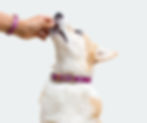
As pet owners, we’re always looking for ways to keep our dogs happy and healthy. While we’re often quick to schedule regular vet checkups and ensure their diet is balanced, dental care can sometimes fall by the wayside.
Yet, maintaining good dental hygiene is just as important for dogs as it is for humans—poor dental health can lead to painful conditions like gum disease, tooth loss, and even systemic infections that affect the heart and kidneys. Fortunately, improving your dog’s dental health doesn’t have to be complicated.
Here are five simple, effective ways to keep your dog’s teeth clean and their smile bright.
1. Brush Your Dog’s Teeth Regularly
Brushing your dog’s teeth is the gold standard when it comes to preventing dental disease. Just like humans, plaque and tartar can build up on your dog’s teeth, leading to bad breath, gum disease, and tooth decay. Brushing regularly (ideally daily) is the most effective way to combat these issues.
How to Brush Your Dog's Teeth:
Choose the Right Tools: Use a toothbrush specifically designed for dogs—these have soft bristles to protect their gums. Finger brushes are also an option for smaller dogs. Make sure you have dog-safe toothpaste, as human toothpaste contains ingredients that can be toxic to dogs.
Start Slow: If your dog isn’t used to having their teeth brushed, introduce them to the process gradually. Let them sniff the toothbrush and taste a little bit of the toothpaste before you begin. Start by brushing just a few teeth at a time and work your way up to a full cleaning session.
Make It a Routine: Brushing your dog’s teeth doesn’t have to be stressful. Set aside a few minutes every day, perhaps after a walk or during a quiet moment at home. With patience and consistency, your dog will start to accept it as part of their regular routine.
Pro Tip: If your dog is particularly resistant to brushing, you can try a few different flavors of dog toothpaste (like peanut butter or poultry) to see which one they like best.
2. Offer Dental Chews and Toys
Chewing is a natural behavior for dogs, and it can actually benefit their dental health. Dental chews and toys help clean your dog’s teeth by scraping off plaque and tartar as they chew. Plus, they give your dog a satisfying activity that promotes oral hygiene.
Best Dental Chews and Toys:
Dental Chews: Look for products that are specifically designed to promote dental health, like Greenies or Virbac C.E.T. Enzymatic Chews. These are formulated to reduce plaque and tartar while being tasty enough to encourage regular chewing.
Dental Toys: Rubber or nylon toys with grooves and ridges are excellent for massaging your dog’s gums and cleaning their teeth as they chew. Some toys are even designed with dental health in mind, like the KONG Dental Toy, which is made with natural rubber and helps remove food debris and plaque.
Safety First: Always choose chews and toys that are appropriate for your dog’s size and chewing strength. For example, hard chews like bones can be too tough for smaller dogs or dogs with dental issues, potentially causing damage to their teeth.
Pro Tip: Make sure to supervise your dog while they chew to prevent accidental swallowing of large pieces, especially with tougher chews like rawhide.

3. Schedule Regular Vet Checkups
Routine vet visits are essential for maintaining your dog’s overall health, and dental care is no exception. A professional examination will help detect early signs of dental problems that you may not notice at home, such as gum disease or tooth infections. Regular checkups also give your vet the chance to provide more advanced care, including professional cleanings.
Why Vet Checkups Matter:
Dental Examinations: Your vet will check for signs of plaque buildup, gingivitis (gum inflammation), and other dental issues during each exam. Early intervention can prevent more serious health problems down the road.
Professional Cleanings: Depending on the severity of your dog’s dental condition, your vet may recommend a professional dental cleaning, which involves scaling and polishing the teeth under general anesthesia. This is typically done once a year or as needed for dogs with more advanced dental issues.
Signs to Watch For: Be on the lookout for signs that your dog may be experiencing dental discomfort, such as bad breath, drooling, difficulty chewing, pawing at the mouth, or red, swollen gums.
Pro Tip: Talk to your vet about dental products or services, such as specialized toothbrushes or dental diets, that can complement your at-home care routine.
4. Provide a Balanced Diet
The food you feed your dog plays a significant role in their oral health. While some foods can contribute to plaque buildup, others can actually help clean their teeth. A balanced, well-rounded diet is essential for keeping your dog’s teeth and gums in top condition.
How Diet Affects Dental Health:
Dry Food vs. Wet Food: Dry kibble can help reduce plaque buildup because its crunchy texture scrapes the surface of the teeth as your dog chews. In contrast, wet food can stick to teeth and contribute to plaque formation.
Dental-Specific Diets: There are specialized dental diets available, such as Hill’s Prescription Diet t/d or Royal Canin Dental, which are formulated to reduce plaque and tartar buildup. These diets often have a special texture that helps clean your dog’s teeth while they eat.
Fresh Water: Always provide your dog with fresh, clean water. Water helps wash away food particles and bacteria, reducing the risk of plaque and tartar buildup.
Pro Tip: Avoid feeding your dog human foods that are high in sugars or starches, as these can contribute to dental problems. Stick to treats that are specifically designed for dogs and that promote dental health.
5. Consider Dental Water Additives or Sprays
If you find it difficult to brush your dog’s teeth regularly, dental water additives or sprays can be a convenient alternative. These products work by reducing bacteria in your dog’s mouth and helping to break down plaque.
How They Work:
Dental Water Additives: These are added to your dog’s water bowl and help reduce plaque, tartar, and bad breath by neutralizing bacteria in the mouth. Most water additives are tasteless and odorless, so they’re easy to incorporate into your dog’s daily routine.
Dental Sprays: These can be sprayed directly onto your dog’s teeth and gums for a quick cleaning. Some sprays even contain enzymes that help break down plaque and tartar.
Effectiveness: While dental additives and sprays are not a substitute for brushing, they can be a useful addition to your dog’s oral care routine. They’re especially helpful for dogs who are resistant to tooth brushing.
Pro Tip: Always check with your vet before using dental additives or sprays, as some dogs may have sensitivities to certain ingredients.

A Healthy Smile Starts with Consistent Care
Dental health is an essential part of your dog’s overall well-being, and with just a little effort, you can help ensure that your dog’s teeth stay strong and healthy for years to come. By brushing regularly, offering dental chews, scheduling routine vet checkups, providing a balanced diet, and considering water additives or sprays, you’ll be well on your way to maintaining your dog’s dental health.
Remember, consistent care is key—so start implementing these simple steps today, and your dog will thank you with a healthier, happier smile.




